What Is Mental Health First Aid and How Can I Help in a Crisis?
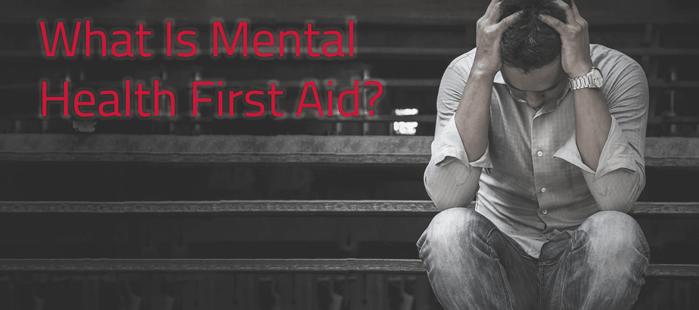
Mental Health First Aid is one of those courses we all think is a good idea, but how many of us have done a course? With 1 in 5 Australian adults experiencing symptoms of mental illness during any 12 month period, the likelihood you could need to use skills taught in a mental health first aid course is high. Even though we may not always be aware, we’re never very far away from someone with a mental illness.
Imagine a family member or colleague is experiencing a crisis that has you concerned for their health and safety – would you panic, not knowing what to say or do? Or would you feel confident in calmly helping them out of immediate danger and towards medical help? Just like with physical First Aid, being prepared and equipped with skills can make all the difference.
When it comes to mental illnesses, there are many different types and the approach for each situation will vary? Not all mental health crises are the same and knowing the degrees of severity can help you help others and ultimately maybe even save a life.
What is the Aim of Mental Health First Aid?
It can be overwhelming to think of approaching someone experiencing a mental health issue. However, your role is not to diagnose or provide therapy. Your role is to provide support until someone else more qualified arrives and can take over. Just like with regular First Aid, the burden is not on you to ‘fix’ the individual but to be the first point of contact in recognising the issue and referring to medical professionals.
Mental illness is something many of us don’t like to talk about or acknowledge. Unlike say an asthma attack or a bleeding wound, it is not obvious to us what the issue is or what to do about it. Often much of the approach is about communication– knowing when to speak and when to listen. Rather than taking direct action with say CPR or bandaging, it is a more subtle approach you will need to take. But with thousands of people losing their lives every year in relation to mental health, it is a cause no less worthy of doing training or taking action for.
What Is a Mental Illness?
Mental illness is extremely common and does not discriminate by gender, age, income or culture. In fact, it’s been estimated that 45% of Australians aged 16-85 (7.3 million people) will experience a mental disorder at some time in their life (ABS 2008).
But what is a mental illness? It is considered a disturbance in our understanding, emotions or behaviours that reflects an underlying dysfunction.
Many of us will feel depressed or anxious at some point in life. However, this does not mean we are all experiencing mental illness. When mental illness is diagnosed, a list of symptoms are taken by a mental health professional like a psychologist or psychiatrist and compared to the criteria in medical textbooks (the DSM).
Having a mental illness doesn’t mean a person:
- Is violent
- Is not in control of their behaviour
- Has symptoms all the time
- Is unable to work
Comedian Steven Fry describes a parallel of mental illness as being like the weather. Weather is real and it exists. When it rains, you get wet. There is not much you can do to control that, even if you wish hard for it to stop raining. But even if the weather is stormy, one day it will stop raining and pulling gale force winds. As a First Aider, you can help them see through the storm.
Some Common Types of Mental Disorders
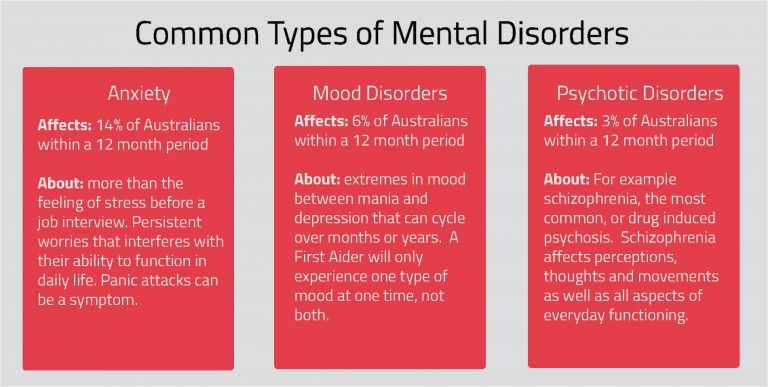
What Is a Mental Health Crisis?
A mental health crisis can be described as an abnormal reaction to a traumatic or negative experience or event, for example suicidality, aggression or self-harm. Even if the event might be considered traumatic, for example a car accident, it may affect one person seriously and another person very little or not at all. It is a very individual response.
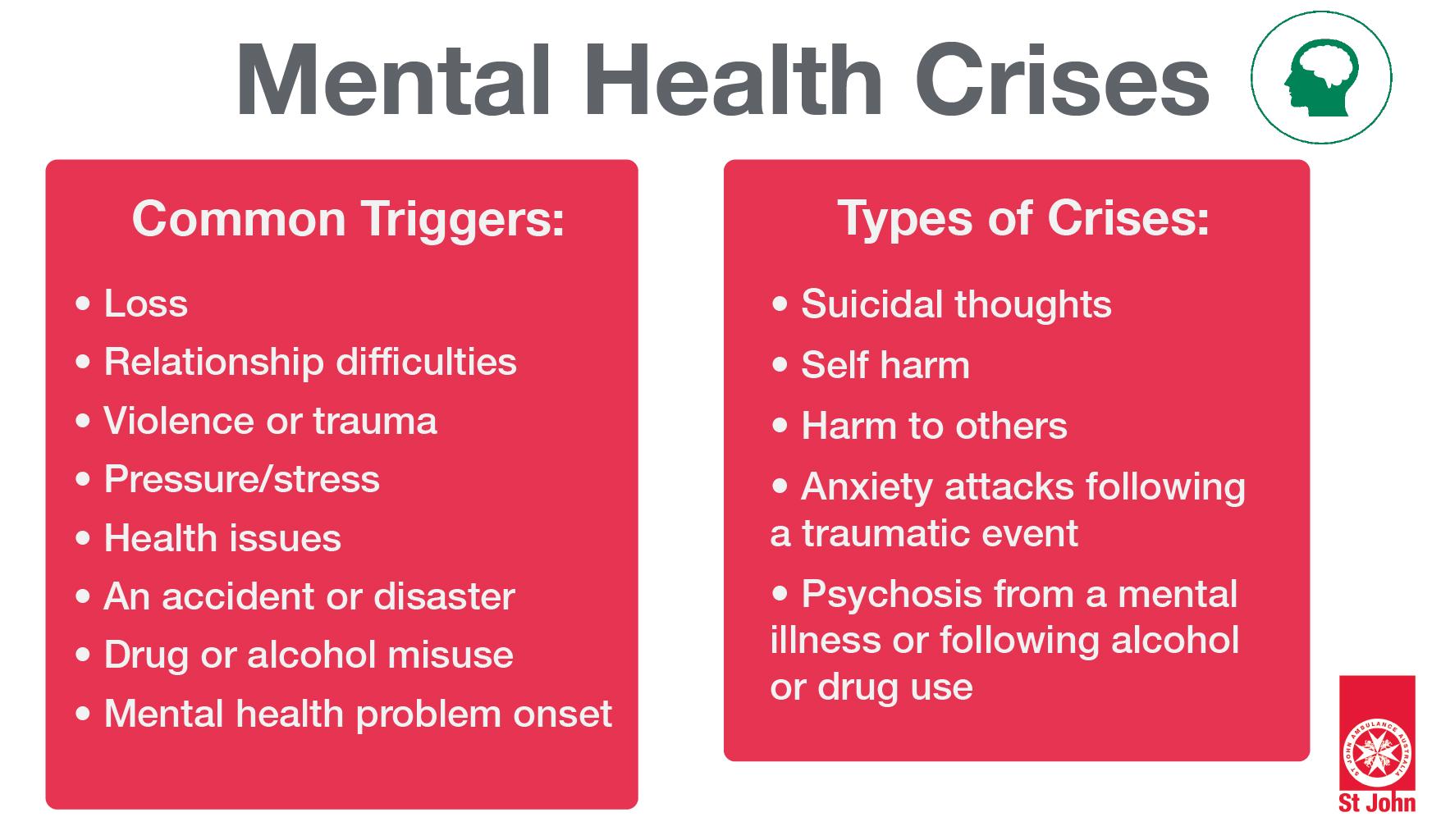
What Duty of Care Am I Obligated To Provide?
If in the workplace and a designated first aider, you have a responsibility to assist someone at risk. This includes mental health issues.
However, the priority is safety to yourself, others and the casualty. If you have any doubts, call for help immediately. If in the workplace, follow any policies and procedures.
If you’re not in a workplace, you don’t have a legal duty of care to a casualty. Similar to with First Aid, your duty of case begins if you decide to intervene with assistance. Being trained and prepared will mean you have the confidence and skills to
What Steps Should I Follow to Intervene in a Mental Health Crisis?
Firstly, you should approach all mental health crises with sensitivity, if not it can have severe results for the individual and make the situation worse. Be empathetic and not judgemental, as the individual is already in a vulnerable position and may close up further if pushed too hard.
At St John Ambulance Australia (Victoria), we advocate the Listen to your HEAD approach:
Listen: the most important point, listen at every stage and remain calm
Hazards: check for hazards and dangers before anything else. Don’t hesitate to call 000 if you think it warrants it
Engage: ask if you can help. Start by asking the individual what is happening and explain how they are feeling. Try not to talk too much, even if you want to – it is not about you and your opinions.
If you think they are at risk for suicide, don’t leave them alone and call 000 immediately.
Action: Make a plan to help them help themselves. Get someone to help, e.g. GP, family member.
Debrief: look after yourself by doing a self-check. Are you feeling ok – you may need to talk to a peer or mental health professional yourself if the situation is causing you distress.
How Can I Recognise The Signs That A Person Might Be At Risk?
Some warning signs:
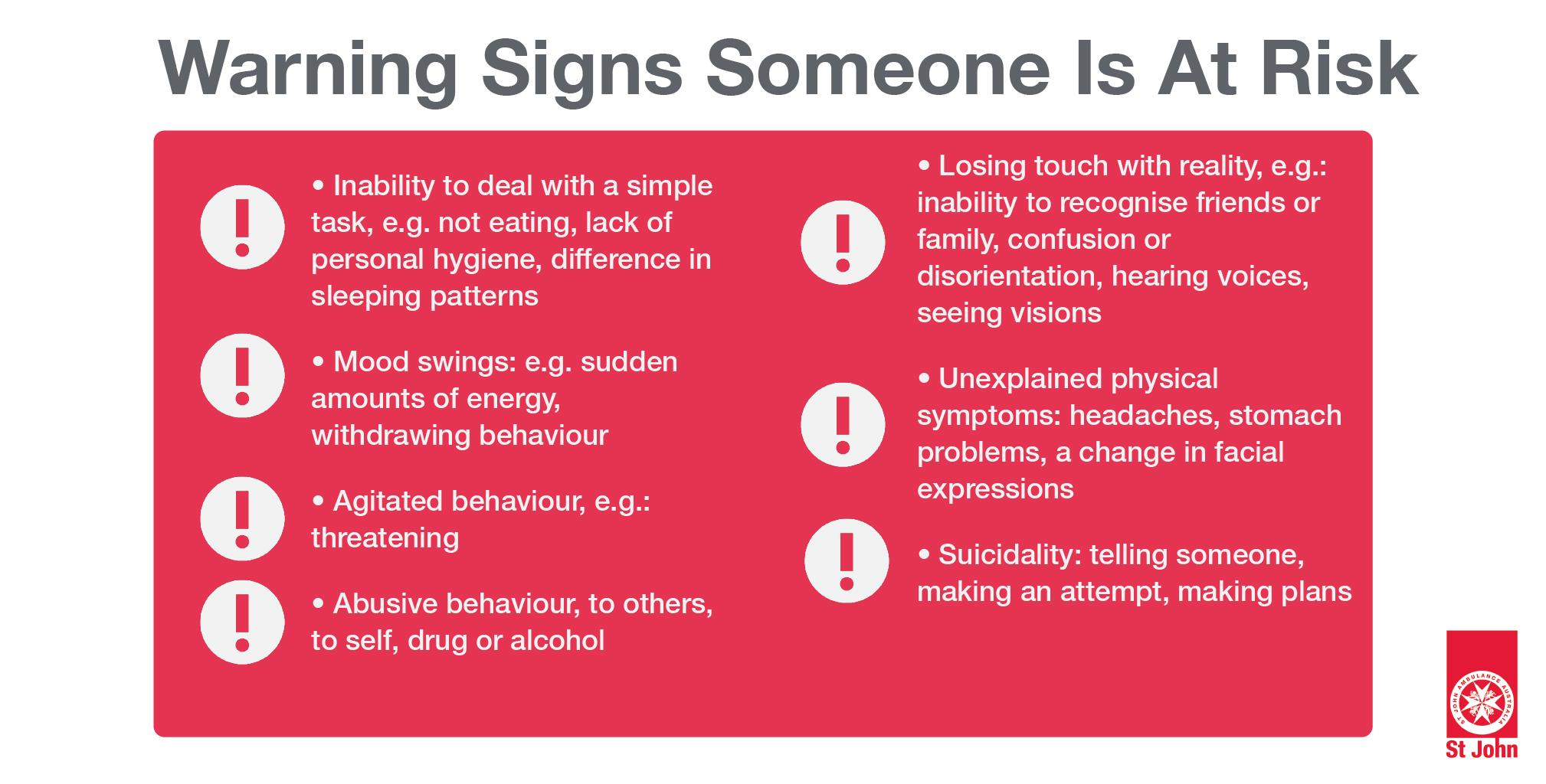
Signs can appear differently in different people.
What Support Can I Provide Someone I Suspect Might Be Suicidal?
This can be a difficult and alarming situation. Again, start by listening to what they have to say:
- Ask if they are having thoughts about suicide
- Ask if they have a plan
- If yes, what is the plan?
- Do they have the means to carry out the plan?
- If yes, call 000 immediately. Do not leave them alone until help arrives
Where Can I Go For Assistance?
- Emergency services, which includes Ambulance and also CATT (Crisis Assessment and Treatment Teams) who operate 24/7
- Mental health professionals: GP, psychiatrists, psychologists, counsellors (if not in immediate danger)
- Employee Assistance Program through a workplace
- Helplines:
- Lifeline
- Beyondblue
- Suicide callback service
- Kids helpline
- Headspace
- ReachOut
- Mindhealth connect
- Online or written resources
Encourage the person to seek help with a professional. Follow up with them to make sure they are doing so, as they may be reluctant to seek help.
What About Me?
Looking after yourself is as important as helping the casualty. Debrief with yourself to take a check of how you are feeling. It can be stressful and draining to provide mental health First Aid. Don’t hesitate to talk to people around you, like friends and family, or a mental health professional if you need.
Just like with the DRSABCD action plan for ‘physical’ first aid, you can approach a mental health crisis with a similar stepped process. Being aware, trained and equipped to help someone experiencing mental health distress will greatly increase your confidence and ability to possibly save a life one day.

Mental Health and Wellbeing Essentials Workshop
Delivered in a face-to-face workshop setting. Suitable for members of the general public interested in prevention skills and strategies. Students may or may not be employed or part of a workplace.
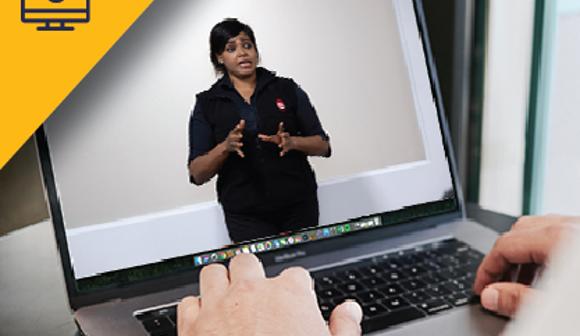
Mental health and crisis support (Virtual)
Gain the essential skills and confidence to recognise and support people with a range of mental health issues such as depression, anxiety, suicide and addiction.

Mental health and crisis support (Face-to-face)
Gain the essential skills and confidence to recognise and support people with a range of mental health issues such as depression, anxiety, suicide and addiction.
